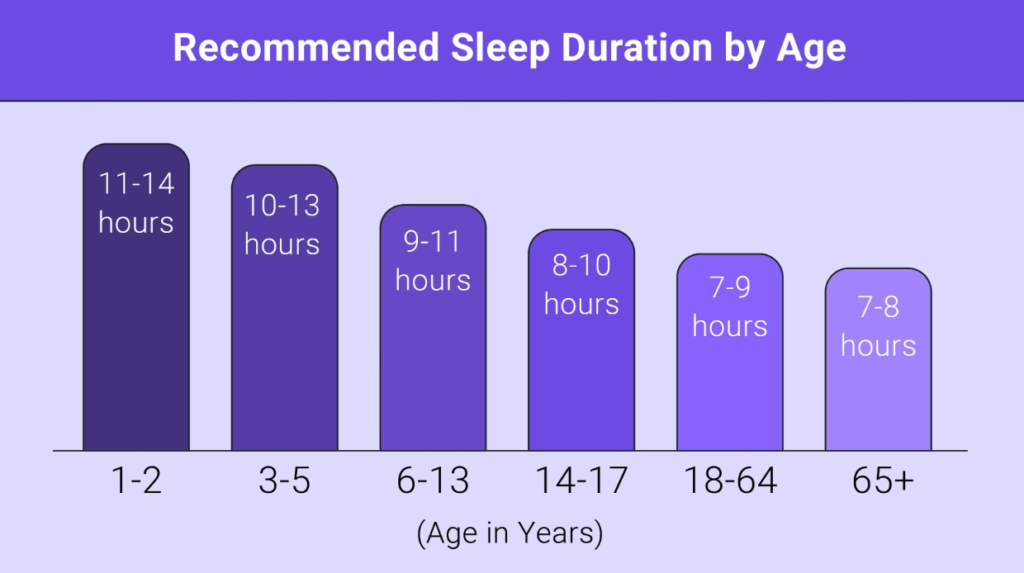Is it a coincidence that the marked decrease in average sleep duration in the last 50 years has coincided with an increased prevalence of obesity across the globe?
It has been known for several decades that sleep is a major modulator of hormonal release, glucose regulation and cardiovascular function. In particular, slow wave sleep (SWS) or non-REM Stage 3 sleep, thought to be the most restorative sleep stage, is associated with decreased heart rate, blood pressure, sympathetic nervous activity, compared with wakefulness (1). Lack enough sleep each night, and a multitude of unpleasant circumstances ensue.
Let’s first look at the recommended amount of sleep required throughout all stages of life:

How do you rate based on your age?
Is sleep something that you prioritise?
Furthermore, is your bodyweight where you’d like it to be?
This blog highlights 3 reasons why adequate sleep is a must to achieve your weight loss or ideal bodyweight goals. If you’re about to commence on a lifestyle change to improve your weight and waistline, or have hit a recent weight loss plateau and can’t pinpoint why, focusing on achieving adequate sleep each night is vitally important to support your efforts and goal progress.
1. Adequate sleep for reduced cortisol levels
Cortisol is the predominant glucocorticoid (a class of steroid hormones) secreted by the adrenal glands in humans. Our body’s 24-hour circadian rhythm drives natural cortisol release throughout the day, however lifestyle factors can elevate our cortisol levels based on our environment and stressors encountered. Think a stressful presentation at work, or oncoming head-on collision avoided at the last second – our body’s sympathetic nervous system is activated during moments of stress to ensure clarity of thought and snap decisions to ensure our well-being.
If we look back to our most restorative sleep stage, SWS or non-REM Stage 3 sleep, this is when anabolic growth hormones are released (to help recover from the arduous tasks of the day prior) while the stress hormone cortisol is inhibited (1).
When it comes to fat distribution, cortisol in known to have a ‘double-edged sword’ effect – it depletes subcutaneous fat (which is generally beneficial and necessary to support important bodily functions) and replaces it with more harmful visceral fat. Visceral fat is the fat that surrounds our internal organs, and is known to have a strong correlation with increased risk of a variety of harmful chronic diseases, namely Type 2 Diabetes, cardiovascular disease and stroke.
Both elevated lifestyle stress levels and inadequate sleep (eg less than 7 hours for an adult) will elevate your cortisol levels, with affected metabolism and a net increase in visceral fat the likely end outcome.
2. Adequate sleep to modulate appetite levels
In a study conducted by Dr. Eve Van Cauter at the University of Chicago, healthy young adult participants were separated into two groups – one group was permitted the opportunity to sleep the recommended amount of 8.5 hours per night for five consecutive nights, whereas the second group was restricted to 4-5 hours per night for five nights. Both groups were otherwise allowed the same amount and type of food, and physical activity was constant. Each day, sense of hunger and food intake were monitored, as were circulating levels of two hormones – leptin and ghrelin.
Ghrelin is important to our metabolic health as it triggers a strong sense of hunger, whereas Leptin is important as it signals a sense of feeling full (more on this in point #3). An imbalance in either or both of these hormones can trigger increased eating, the likely result being weight gain.
Van Cauter found that individuals who slept 4-5 hours per night reported a greater sense of hunger than the non-restricted sleep group (recall that both groups were provided with the same amount of food and performed the same amount of physical activity each day). This strong rise in hunger and appetite occurred rapidly, as early as the second day of the trial. This illustrates yet another impact of acute sleep loss, more of which can be discovered by reading our recent blog titled How to Avoid the Negative Effects of Acute Sleep Loss on Physical Performance.
Inadequate sleep quantity was discovered to increase levels of grehlin – this meant that individuals were receiving amplified messages of “I’m still hungry” when they were anything but.
3. Adequate sleep to modulate satiation
Inadequate sleep is also known to reduce circulating concentrations of leptin, the hormone that tells us when we’re full. It’s plain to see that when combined with elevated ghrelin levels and a delay in “I’m still hungry” messages, dietary chaos may quickly follow.
Van Cauter then looked at the flow on effect of this hormonal disruption. Did feeling more hungry actually lead to eating more?
Another similar study split participants into two groups – sleep non-restricted and sleep restricted to 4.5 hours per night, for four consecutive nights. Participants were again kept to the same amount of physical activity. They were given free access to food, and caloric intake was monitored by the researchers.
The study found that those who slept less consumed an average of 300 additional calories per day, equating to over 1000 more calories consumed over the four days. Extrapolate this calorie surplus over a month, year or decade, and it’s easy to see how achieving your ideal bodyweight when not sleeping enough can become a significant challenge.
Van Cauter then discovered even more gold – weight gain caused by short sleep is not just a matter of eating more, but also causes a change in what you binge eat. Looking at results across sleep studies conducted, Van Cauter discovered an alarming connection – cravings for sweets and carbohydrate-rich foods (eg breads and pasta) increased by 30-40% when sleep was reduced by several hours each night.
Is this a coping mechanism to fuel the body with more energy-dense foods due to lagging energy levels throughout the day following a lack of sleep?
Either way, it’s going to be very unhelpful in achieving your ideal bodyweight. And it’s likely that if your batteries are low following lack of sleep, your motivation to be physically activity is likely to drop off too. End result – more calorie-dense food consumed, and less calories expended via exercise.
Conclusion
The importance of consistently achieving adequate sleep cannot be undervalued – this blog has focused on the connection between sleep and weight loss, but the same blog could be written for the connection between sleep and Dementia-risk; sleep and Type 2 Diabetes risk; and sleep and Cancer risk.
Simply put – the less you sleep, the more you are likely to eat. Additionally, your body becomes unable to manage those calories effectively resulting in dysregulated metabolism.
Sleep more and you will have greater clarity and self-control when it comes to food consumption. Your body’s ability to effectively store and metabolise these calories will also improve.
Knowing more on the physiological domino-effect of a lack of sleep on your hormones, appetite-control and fat storage capabilities now leads you to the best part – to put measures in place to ensure a full and glorious night’s sleep! To up-skill on how to improve your own sleep hygiene to sleep better than ever, read our blog titled 4 Proven Ways to Improve Your Sleep Today.
If losing weight has been difficult for you, even with your nutrition and exercise practices on point, optimising your sleep could be the missing ingredient you’re seeking!
Happy training (and sleeping 💤)
Luke
References
- Van Cauter, E., Spiegel, K., Tasali, E., Leproult, R. Metabolic consequences of sleep and sleep loss (2008), Sleep Medicine, Vol 9, Supp 1, pg S23-S28, https://doi.org/10.1016/S1389-9457(08)70013-3
- Walker. M. Why we sleep: The new science of sleep and dreams (2017), Penguin Random House
- Attia, P., Gifford, B. Outlive: The science and art of longevity (2023), Penguin Random House
- Picture sourced from https://sleepalpha.co.uk/blogs/sleep-improvement-blogs/adults-should-get-7-9-hours-of-sleep-per-night, accessed March 26th 2024

0 Comments